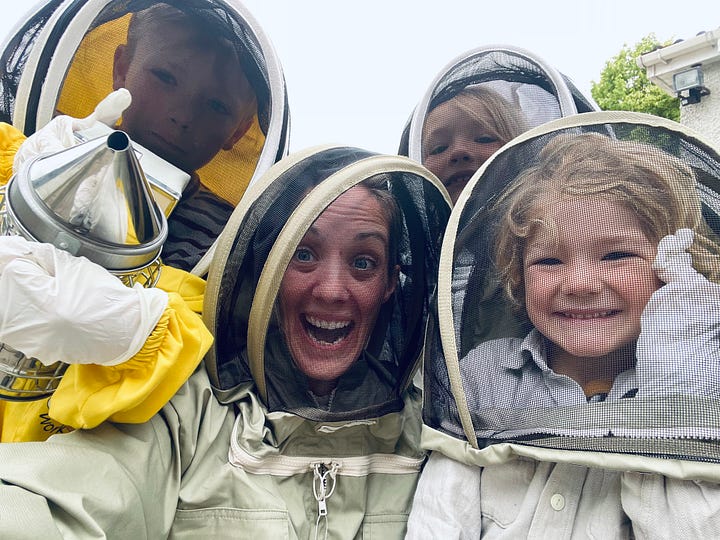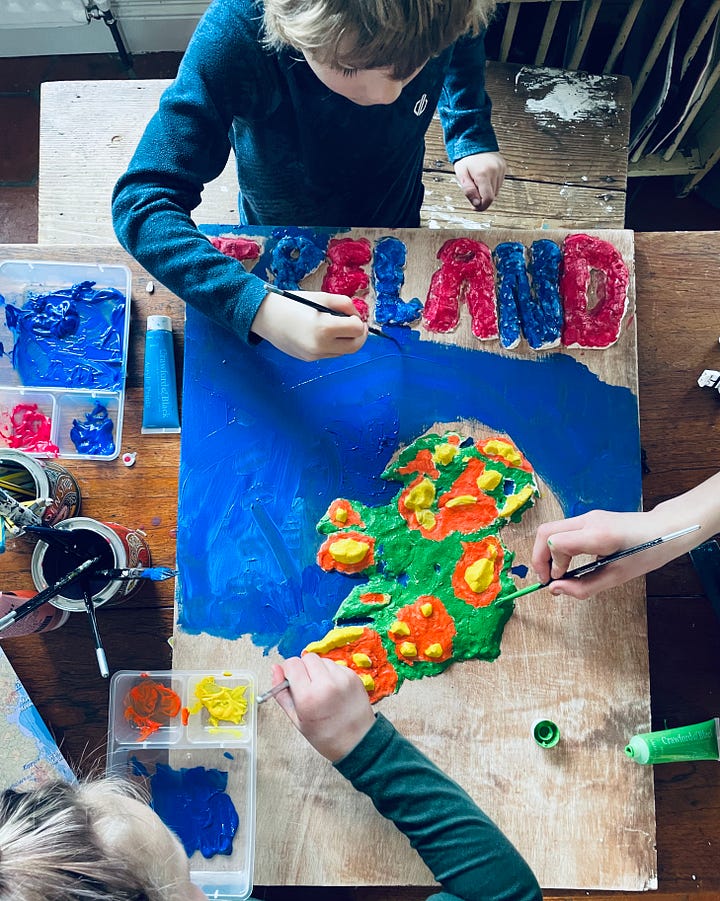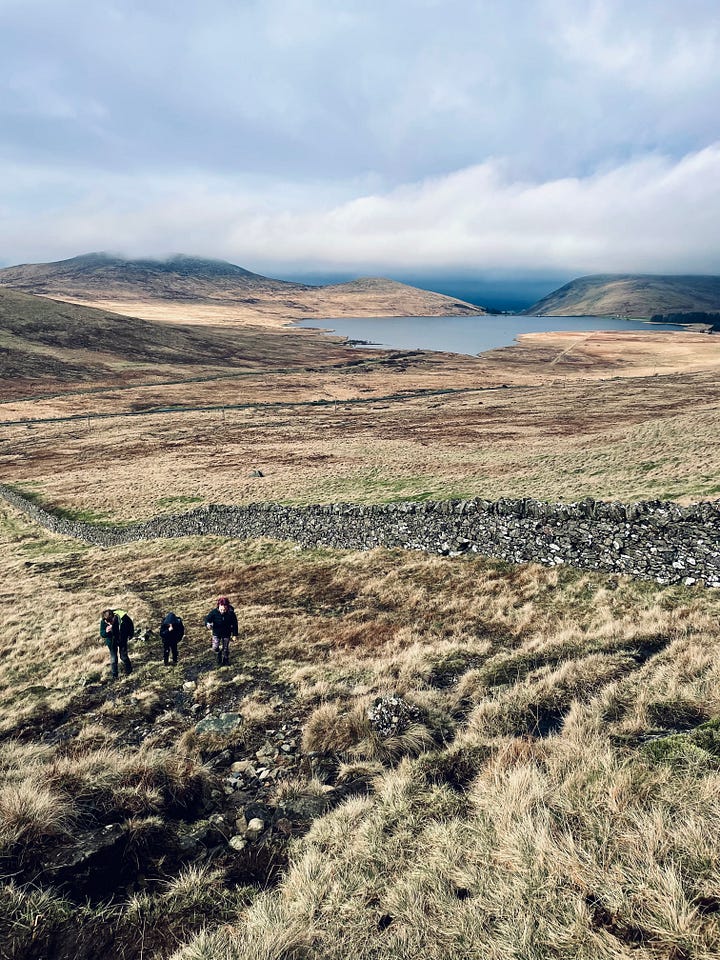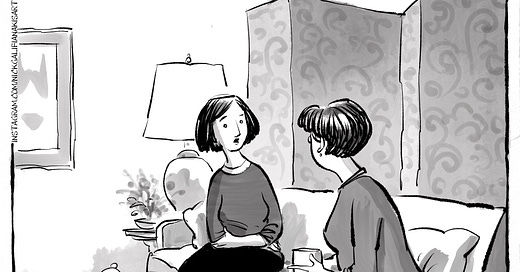The hypothetical conversation in my head at the moment goes something like this:
Potential Employer (PE) : How can you account for the gap in your CV?
Me: Did you know there is a crack in our society through which many young women fall? It’s called Motherhood*. Down there we develop the most incredible skills, but I could not find the part of the application where I could list them. Could I outline them now?
PE shuffles papers and looks to his colleagues with wild eyes.
PE: Ahem, yes, of course.
Me: People management skills would be top of the list. My people were very small and incapable of even the most basic tasks. Navigating toilet breaks with individually tailored feeding systems and basic literacy training required top level logistical planning. Add to that list: conflict resolution, time management, excellent verbal skills, flexibility and teamwork. I was promoted to Chief Executive Officer within a year, and was responsible for driving the entire organisation forward (so. much. driving). Would you like some specific examples?
PE would not, but is far too polite.
PE: Yes, of course.
Me: I demonstrated excellent critical thinking the day one of my charges locked four of us in our front porch. We spent six hours in there with no hope of rescue, but isn’t it marvellous how the imagination knocks down walls? We survived on Rich Tea biscuits and stories until the postman arrived. I led my team through a crisis; add leadership skills to the list.
I did the work of two people for many years (my close colleague was busy being chewed up and spat out by the medical training system). This involved feeding people and pigs, cleaning toilets and candling eggs, history lessons while skinning ducks. Put multi-tasking down there.
Once, our pigs broke into a field of heifers and their calves. I hopped a fence with my youngest in a backpack carrier and we ran for our lives when the cows stampeded. I called my colleague’s best friend to help out. I believe you’d call that outsourcing.
PE nods. Beads of sweat have gathered on his upper lip. He motions to his female counterpart (FC) to continue.
FC: Did you work at all during the last thirteen years?
Me: Haven’t you been listening? I worked harder than I ever knew I could. Every day I repeated the same mundane tasks but with love and great attention to detail. Do you need proof? How can I measure the happiness of my team? Their critical minds and survival skills; the books they have read; their passion for justice; their ability to ask a good question?
What about my experience? That crack into which we disappear is a crucible; I am refined.
But yes, I have ‘worked’. There were days I sent my charges on training days with my first employer (we never really retire, do we?) so I could further my career. That in itself required impressive juggling skills.
(FC makes a small noise in the back of her throat.)
So, here are my publications, my clients, my references. That should tick your box.
They Don’t Remember




When I ask my children about the last decade, there is so little they remember. And it’s not their fault. You see, my primary concern was that I would get in the way of their creative flow. If they saw me, they’d ask for help. If I stepped in, it broke the magic of their imaginary realm.
So I lingered on the wild edges of their play, clearing the main obstructions like a bulldozer: a school system that did not meet their needs; the walls of a room; the expectation that milestones should be reached in a certain time; the word should at all; and then, a home education environment they had outgrown. In all of this, I was off side, advocating, protecting, sowing seeds of wildness to grow in, through and all around them.
And they don’t remember.
According to Dr James Ost, senior lecturer in psychology at the University of Portsmouth, who specialises in the study of memory, not remembering much of your childhood is normal, mostly because it is mundane1.
Many of the memories they do have feature my husband, and as much as I adore him, that’s tough. It makes sense though - his presence was a treat; a break from the norm. Mine was their bread and butter, and that was an intentional but also very difficult decision to make.
And you would not believe how many people said: ‘It’s all right for you, your husband is a doctor.’ While I acknowledge that the financial side of the decision was made possible based on my husband’s salary, it was by no means easier.
I stepped away from my writing career just as it was taking off. I had an agent, a published novel, and Arts Council funding to write another. Many authors manage to write on and raise children - I am in awe of them. I never found a way to do that. Over the past decade, my agent retired, my publishing house refused to pay my royalties and my contemporaries went on to publish an impressive body of work.
Add to that the challenge of not making a financial contribution to my household while occupying a top tier caring role. Then there is my present reality: I have stepped back into my line of work at the end of the queue with no agent or links to the publishing world.
I don’t regret the sacrifices I made. In fact, I list them regularly in my journal as things for which I am profoundly grateful. These two realities can exist at the same time.
Trad Wife Outrage
A friend recently referred to me as a ‘Trad wife.’ She meant it as a compliment. I went off to ask Google what it meant and disappeared into a labyrinth. By definition it is a woman who practises typical gender roles in a marriage; a homemaker; a woman who doesn't work so as to look after their children, their husband, their home and then talk non-stop about how great this is on social media2; a return to starkly defined gender roles: wives quietly and contentedly keep house while husbands control the purse strings3.
An article in Psychology Today4 tells me that one of the appeals of giving up work to stay at home is ‘an easier life.’ It also tells me that the danger of domestic devotion is ‘learned helplessness’.
The outrage (and don’t we just love to be outraged) is yet another way to pit us against one another. I can see why my friend called me a Trad Wife - for many years I was at home with my children, educating them, baking bread, growing vegetables and raising livestock. I even talked about how great it was on social media. My husband was at work most of the time, and we lived predominantly off his salary. But these are only some of the facts - there are so many more. When did we become so incapable of seeing life decisions as a complex cauldron of good intentions, regrettable mistakes and diverse expressions of humanity? Isn’t motherhood hard enough?
When I read the experience of a Paris-based journalist who turned ‘Trad Wife’ for a week and wrote about it for Vogue5, I am saddened more than anything else. ‘I feel dull, kinda dead inside, and my world feels tiny compared to his (husband)’, she writes after a long day at home with her children.
Both the movement and much of the criticism of it reduce complicated circumstances and motivations to simple equations and it makes my blood boil. It is a weapon of mass distraction6; a way to keep us squabbling about who is right and who is wrong rather than appreciating the many faces of motherhood.
So, perhaps I should add to the list for my future employers my ability to express fury at injustice. And tenacity, because at a time in our history when so much is made public, the invisibility of motherhood, in all its shapes and forms, feels like disappearing down a mine shaft with no map.
But there is gold.
In her stride
We all sacrifice something. Every mother I meet is trying to navigate the worlds of career and motherhood with ninja-esque agility.
I listen to my sister-in-law talk about getting her three children out to three different schools and herself off to work and I think - you’re bloody marvellous. Because one likes his sandwiches just so and the other needs milk for his cookery class and the third wanted to bring ocean toys in that day and she’s taking it all in her stride.
What about my friend who let her son bury a whale skull in the veggie bed to clean it before he displays it in his bedroom? Or the one who qualified as a midwife at the same time as her adult daughter graduated as a nurse?
I’m surrounded by these women, detailing their work and domesticity like it’s no big thing when it is, in fact, everything. They’re building companies while wiping noses; learning how to code while checking homework; dropping kids on time then arriving late to meetings; telling bedtime stories then finishing work in the wee hours; letting things slide and picking up all kinds of slack.
The invisible work we do is the fabric on which the tapestry of our time is stitched, and it matters. Society benefits from our caring, domestic, nurturing skills while belittling them in the same breath.
The Gap
A 2022 report7 into the gender pay gap in the health and care sector following COVID-19 revealed a double jeopardy for women. Sixty-seven percent of workers in this sector are women. Not only are their average earnings lower, there is also a 24 percent gender pay gap.
We do not, as a society, value the role of caregivers, paid or unpaid.
I am grateful for the work of people like Amy Whitehouse and her Flex Appeal8 campaign. She is passionate about changing the fabric of the working world for those with caring responsibilities. Closer to home I have The National Women’s Council9, WorkEqual10 and the work of artists such as Kerri ní Dochartaigh11 and Claire Kilroy (read this beautiful conversation about her novel Soldier Sailor here12) who write powerfully about motherhood.
In my immediate community, I have beautiful friends who create sacred spaces for women to share their stories of motherhood. I write more about this here:
Out of the Mine
So, what does it mean for me to become visible at this time? To climb out of the mine, through the crack, with all this gold in my pockets? I’m not really sure. I’m writing books and trying to get them published; I’m sharing my work here as part of a rich tapestry of writing on a wide range of subjects; I’m engaging imaginatively with future employers and I’m extending my care beyond the confines of my home.
One of the best things about navigating this chasm for the last decade is that I don’t need anyone to tell me I am doing a good job. As a beautiful reader told me recently, we (as women) are the map. I became my own compass and learned to judge the ‘success’ and value of my work by different standards:
Can I do hard things? Am I curious? Am I raising wholehearted children? Do I laugh often? Do I tell the truth? Are my relationships healthy? Can I transform pain and boredom into art? Can I receive life as a gift?
//
FC scans sheet for closing question.
FC: What is your greatest achievement?
Me: They’re in the car outside reading Harry Potter and eating cheerios out of the box, will I bring them in?
FC clears her throat.
FC: No, no, that won’t be necessary.
Me: (Handing over my 83,000 word manuscript) There’s this too.
PE and FC conclude interview. Someone stifles a laugh as I leave the room. It is not until that evening that I find stuck porridge on the seat of my trousers.
PS: I am teaching a Poetry Slam workshop in the school my children now attend. My preparation has involved watching some wonderful videos on Button Poetry13. I dare you to watch this one entitled Your Mom without welling up.
*I acknowledge that there are many expressions of parenthood, but mine is as a woman and mother and I write from this perspective.
A quote from Brian Mclaren in his excellent book Life After Doom.








Love, love, love this. A brave, intentional pioneering mum! Your children will rise up and call you blessed!
Brilliant, brilliant, brilliant—as always! So much to reflect on. Your writing never ends for me at the full stop. Thank you, Bethany. x